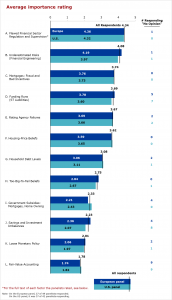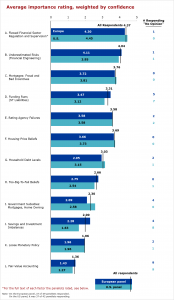The IGM Center at the University of Chicago has asked its American and European economist panel to rate the main causes of the financial crisis. For both American and European economists, the main culprit of the crisis was financial regulation and supervision.
“Most economists agree that the problem we are witnessing today developed over a long period of time. For more than a decade, a massive amount of money flowed into the United States from investors abroad,” said President George W. Bush in an address to the nation on September 24, 2008. He attributed the financial crisis to the so-called savings glut theory: “excessive” Chinese savings led to excessive lending in the United States. Almost a decade later, do economists still think this is the main cause of the crisis?
The IGM Center at the University of Chicago has asked its American and European Economist Expert Panel to rate the main causes of the financial crisis, from 0 (not important at all) to 5 (very important).

As the figure above shows, the saving glut theory scores toward the bottom of the ranking with an average of only 2.1 among American economists and 2.4 among European ones. Also at the bottom are two theories that featured prominently in the Financial Crisis Inquiry Commission Report: the idea that monetary policy had been too loose and that the government distorted the market by subsidizing mortgages through Fannie Mae and Freddie Mac.
For both American and European economists, the main culprit of the crisis was financial regulation and supervision (a score of 4.3 for the American panel and 4.4 for the European one). This was certainly not the attitude at the time, as evidenced by President Obama’s decision to appoint Timothy Geithner (who in the five years leading up to the crisis was responsible for regulating the main U.S. banks) as Secretary of Treasury and reappoint Ben Bernanke (who had been either Governor or Chairman of the Fed for five of the six years before the crisis) as Fed Chairman.
The financial crisis has shaken the economists’ view of the rationality of individuals and efficiency of markets. After regulation, the most highly rated causes of the crisis were irrational beliefs (on house prices or risk) and corrupt incentives (fraud in mortgages and credit rating agencies). Household debt is only seventh on the list.

What is remarkable is the level of agreement between economists on two sides of the Atlantic. The ranking is identical for the two groups. Yet this similarity hides a great deal of variation within each group. For example, Nobel prizewinner Bengt Holmstrom considers fraud and incentives in mortgages very unimportant (score of 1), while fellow Nobel prizewinners Angus Deaton and Richard Thaler consider them very important (score of 5). Nobel prizewinner Oliver Hart rates loose monetary policy at 4, while his fellow Nobel prizewinner (and colleague) Eric Maskin rates it at only 1. The same is true for the European panel. Several respondents rate loose monetary policy as the most important cause (5), while many others attribute it no importance whatsoever (0). Not a great success for a discipline that claims to be empirically based.
This “blame game” for the financial crisis is not just an academic exercise, though. The response to the 2008 crisis was shaped by Milton Friedman and Anna Schwartz’s interpretation of the causes of the Great Depression. Much as we would wish to avoid financial crises in the future, we know that they are certain to occur and that the prevailing narrative on the causes of the 2008 financial crisis will shape the response to them, as it has already shaped efforts to avoid a repeat. Whether or not one likes the financial regulations of Dodd-Frank, there is no doubt that a major attempt has been made to address the perceived hole in the pre-existing regulation. But what about the other main causes? If the main causes of the financial crisis were inflated beliefs about house prices and underestimation of the risk of mortgage-back securities, what has been done to prevent a repeat?
The IGM Center and the Stigler Center at the University of Chicago have decided to organize a conference to discuss the causes of the financial crisis in September 14-15, 2018. If you are interested in participating, please submit the proposal for a paper by October 31, 2017. More details can be found here.
(Top image by PINGNews, via Flickr [CC BY-SA 2.0])
For further discussion of the 2008 financial crisis, listen to this episode of the Capitalisn’t podcast:
Disclaimer: The ProMarket blog is dedicated to discussing how competition tends to be subverted by special interests. The posts represent the opinions of their writers, not those of the University of Chicago, the Booth School of Business, or its faculty. For more information, please visit ProMarket Blog Policy.






